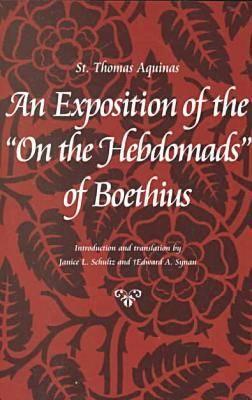An Exposition of the on the Hebdomads of Boethius

An Exposition of the on the Hebdomads of Boethius
In his sixth-century work commonly known as the De hebdomadibus, Boethius (ca. 480-524) poses the question of how created things or substances can be good just as they are--that is, good just by existing--without being the same as the source of all goodness, God, who is understood to be Goodness Itself. In his commentary written in the thirteenth century, St. Thomas Aquinas sets out to explain the problem Boethius is treating as well as to explicate Boethius's solution. In doing so, however, the Angelic Doctor suggests a more developed analysis of goodness, based on his own metaphysical perspective. Still, his view can be seen to continue the emphasis Boethius himself placed on the notion of creation--bringing into being--as crucial to understanding the issues at hand.The introduction to this translation provides critical historical background, including an account of the influence of Cicero and Augustine, for understanding Boethius's view of being, or esse. Based on historical and textual analysis, the authors reaffirm the "traditional" interpretation, which holds that for Boethius esse indicates form rather than a distinct act of being. In articulating the difference between Boethius's and Aquinas's positions on esse and on goodness, and hence the relation of esse and goodness, Schultz and Synan show not only that Aquinas was respectful of Boethius's stance, but that his own position could be seen as a development in harmony with his predecessor's thought. The English translation itself, in facing-page format with the 1992 Leonine critical edition of Aquinas's Latin text, remains faithful to the text and at the same time clear and readable. The work will be valuable to those interested in the fundamental philosophical and theological questions facing mediaeval thinkers and also to those interested in Aquinas's metaphysical thought.ABOUT THE TRANSLATORS:
Janice L. Schultz is professor of philosophy at Canisius College and the author of numerous articles on Thomistic ethical theory. The late Msgr. Edward A. Synan was senior fellow emeritus at the Pontifical Institute of Mediaeval Studies in Toronto and professor emeritus of philosophy at the University of Toronto. He was the author of eight books and many articles and reviews on mediaeval thought as well as Jewish-Christian relations.PRAISE FOR THE BOOK:
"What emerges from this fascinating book is an account by the Last Roman of goodness and existence; an active interpretation of that work by t
PRP: 239.70 Lei
Acesta este Pretul Recomandat de Producator. Pretul de vanzare al produsului este afisat mai jos.
215.73Lei
215.73Lei
239.70 LeiLivrare in 2-4 saptamani
Descrierea produsului
In his sixth-century work commonly known as the De hebdomadibus, Boethius (ca. 480-524) poses the question of how created things or substances can be good just as they are--that is, good just by existing--without being the same as the source of all goodness, God, who is understood to be Goodness Itself. In his commentary written in the thirteenth century, St. Thomas Aquinas sets out to explain the problem Boethius is treating as well as to explicate Boethius's solution. In doing so, however, the Angelic Doctor suggests a more developed analysis of goodness, based on his own metaphysical perspective. Still, his view can be seen to continue the emphasis Boethius himself placed on the notion of creation--bringing into being--as crucial to understanding the issues at hand.The introduction to this translation provides critical historical background, including an account of the influence of Cicero and Augustine, for understanding Boethius's view of being, or esse. Based on historical and textual analysis, the authors reaffirm the "traditional" interpretation, which holds that for Boethius esse indicates form rather than a distinct act of being. In articulating the difference between Boethius's and Aquinas's positions on esse and on goodness, and hence the relation of esse and goodness, Schultz and Synan show not only that Aquinas was respectful of Boethius's stance, but that his own position could be seen as a development in harmony with his predecessor's thought. The English translation itself, in facing-page format with the 1992 Leonine critical edition of Aquinas's Latin text, remains faithful to the text and at the same time clear and readable. The work will be valuable to those interested in the fundamental philosophical and theological questions facing mediaeval thinkers and also to those interested in Aquinas's metaphysical thought.ABOUT THE TRANSLATORS:
Janice L. Schultz is professor of philosophy at Canisius College and the author of numerous articles on Thomistic ethical theory. The late Msgr. Edward A. Synan was senior fellow emeritus at the Pontifical Institute of Mediaeval Studies in Toronto and professor emeritus of philosophy at the University of Toronto. He was the author of eight books and many articles and reviews on mediaeval thought as well as Jewish-Christian relations.PRAISE FOR THE BOOK:
"What emerges from this fascinating book is an account by the Last Roman of goodness and existence; an active interpretation of that work by t
Detaliile produsului








